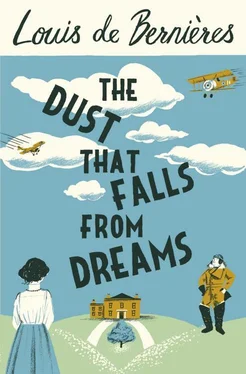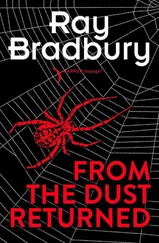Later, when they were going to bed, Rosie said, ‘You shouldn’t have been rude to Mother like that. It was very bad of you, especially in front of Mary. I really think you should apologise tomorrow morning.’
‘I will apologise,’ said Daniel, ‘and all I’ll get in return is more provocation about being French and not being her lost son. Rosie, you must move out of this house and bring Esther with you to live with me. I won’t take this any longer. I ride for hours every Friday night to get here from Birmingham, often in freezing rain, having to mend punctures on the way because of all the horse nails, and I lose every Sunday afternoon driving back again. I’m too much on my own. I want to be with Esther; I don’t want to make do with trying to talk to her on the telephone down a bad line. You don’t know how it cuts me up having to leave her. And I’ve had enough of your mother. You see for yourself how appalling she is, and how badly she behaves towards me. Yes, I know, she’s got excuses. I understand all that. We’ve talked about it a hundred times. But it’s not fair on me. You must move out to the house in Wootton Wawen, and we can start to have a proper family and a proper marriage.’
‘Esther’s very happy here,’ replied Rosie. ‘She loves Caractacus, and she adores her grandfather.’
‘Well, of course she does. We can take the cat with us, can’t we? And I love your father too. He couldn’t be a better father-in-law. I don’t have a father any more, remember? Having him is quite some consolation. That’s the problem, though, isn’t it? It’s your father you don’t want to leave.’
Rosie flushed. She felt the anger of someone who has been told an uncomfortable truth, and has to deny it or evade it. Rosie chose evasion. ‘Well, I do worry about him. He puts himself under terrible strain with all his speculations and investments. Sometimes we’re actually broke for weeks at a time and he’s almost at his wits’ end. Then the money comes back in. It always does in the end, but it’s killing him, I know it is.’
‘I’m not giving you much longer.’
‘Don’t try to bully me. I won’t have it. If I’d known you were a bully I wouldn’t have married you.’
Daniel looked at her balefully, and she cast her eyes down. ‘A bully, eh? And there’s me thinking I’m a man who loves his daughter and his wife and wants to live with them.’
‘I think I’d better sleep in my own room tonight,’ said Rosie quietly.
‘I won’t sleep at all,’ said Daniel, ‘so I might as well be sleepless on my own. Goodnight. Close the door when you leave, would you?’
Rosie turned and left, closing the door softly behind her. She stood there for a while, stock-still in the corridor, wanting to go back, but then she went to her own room with a leaden heart.
93. Mr Hamilton McCosh Learns a Lesson
ONE MORNING MR McCosh stood on the top doorstep of the house, berating the grocer, Mr Ives, who stood before him at the bottom of the steps with his brown shop coat and apron on and his cap in his hands. Mr McCosh was in an uncharacteristically bad temper because both the Malay Rubber Company and the Argentine Railway Company had failed to pay dividends on time, and consequently he was temporarily in a state of deep financial embarrassment. Mr Ives was a solid fellow with a glossy chestnut-brown moustache, and one of his ears flopped over where it had been creased by a bullet.
‘Ives, how dare you?’ bellowed Mr McCosh. ‘How dare you come here demanding money in broad daylight? Have you no respect, man?’
‘I have respect for those who pay their account when it’s due, sir. Those who don’t, sir, I consider to be thieves and scoundrels.’
Mr McCosh was astonished. ‘You are calling me a thief and a scoundrel, man?’
‘You owe me for six months’ provisions,’ replied Mr Ives. ‘I have four employees, a wife and four children. You are not doing your duty by them, sir, when you force me to put them off work, or when my children get no meat and can’t have shoes. You either pay me, sir, or you will oblige me to instruct a bailiff.’
‘A bailiff? A bailiff?!’
‘The bailiff, sir, will enter your property, by force if necessary, and remove goods to the value that you owe, sir.’
‘I know what a bailiff is, Ives. You are threatening me with a bailiff? Do you know who I am, my man? Do you know what I do? I am an investor, a speculator! I build ships and railways and invest in rubber and gas masks and gadgets! Sometimes I have no money at all and sometimes I have an absurd amount. I move it around the world. For six months I have had nothing, and next Monday I will have an absurd amount.’
‘Next Monday, sir?’
‘Yes, next Monday. Now get out of my sight, before I call the police.’
‘You are welcome to call the police,’ said Mr Ives.
‘Away with you, man, away with you!’
Mr Ives turned and walked away, with considerable dignity.
When he returned the following Monday, Millicent fetched Mr McCosh, who emerged moments later carrying an envelope. Instead of touching his cap and leaving, as expected, Mr Ives tore open the envelope and inspected its contents.
‘You have overpaid, sir,’ said Mr Ives.
‘No, I haven’t,’ retorted Mr McCosh impatiently, ‘I’ve paid not only the account but the outstanding interest on the money owed.’
‘That’s very good of you, sir,’ said Mr Ives, ‘but I would rather have the debts paid on time. In my business cash flow is everything. Without the flow, everything seizes up, sir.’
‘Quite, quite.’
Mr Ives withdrew an unsealed envelope from his pocket and handed it to Mr McCosh. ‘Be so kind as to deal with this now,’ he said.
Mr McCosh opened it and unfolded the paper within. He read: ‘“I Hamilton McCosh promise henceforth to pay Mr Ives for his provisions promptly on the due date at the end of each month.” A contract?’
‘Yes, sir, it’s a contract. You sign and date it immediately, sir, or you will kindly take your business elsewhere.’
‘This is outrageous! It’s unheard of!’
‘You have the choice, sir. If you do not pay on time, the following week your kitchen will receive my third-quality box, and the week after it will receive nothing.’
‘Third quality, man?’
‘Third quality. It’s a box with the bruised apples and broken biscuits. Things a bit old and dried out, sir. Dented tins. Bread that’s about to turn or got some mildew you can scrape off. It’s what I do for those that’s down on their luck, sir, and that way nothing gets wasted and the poor folk get something to eat.’
‘Good God!’ exclaimed Hamilton McCosh. He could envisage Cookie’s reaction upon receipt of such a box, and the prospect was not one to be relished.
‘I will take my trade elsewhere!’ threatened Mr McCosh.
‘You won’t, sir, although you may attempt it. All of us round here, we have a blacklist, and we let each other know who not to do business with. You may find yourself, sir, going to market with a basket on your arm and buying third-quality stuff from duckers and divers.’
‘Wait here,’ said Mr McCosh, and he went into the morning room and signed and dated the contract.
‘I appreciate it, sir,’ said Mr Ives, tucking the sheet back into its envelope, and installing it in the pocket of his apron. ‘And another thing I’d appreciate, sir.’
‘Yes, man?’
‘You will no longer address me as “man” or “Ives”. I will address you as “sir”, and you will address me as “Mr Ives”. I was a company sergeant major by the end of the war and I got used to the officers calling me “mister”, so I am sticking with it.’
‘Good God! Whatever next?! Whatever happened to deference?’
Читать дальше












